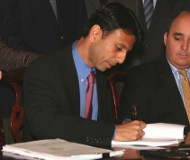6/25/2015
New Presidential Candidate Vetoes Photo Ticketing BillLouisiana governor vetoes insurance ticketing license plate reader legislation days before announcing presidential run.

Louisiana Governor Bobby Jindal announced he would run for the Republican presidential nomination on Tuesday, less than a week after vetoing legislation that would have expanded the use of automated ticketing machines in his state. Earlier this month the state Senate voted 35 to 3 and the state House 83 to 14 to authorize the use of license plate reader system for the purpose of documenting the movements of motorists and issuing automated tickets on the day that a vehicle's insurance might lapse.
Under the program, the sheriff's office in each parish would have been able to set up cameras and add records to a centralized database recording the movement of all motorists in the state for sixty days. This information also would have been available to the private, for-profit contractor operating the cameras as well as any employees of the participating sheriff's offices and state government. The intrusive nature of that surveillance proposal motivated Jindal to exercise his veto authority.
"Camera programs such as these that make private information readily available beyond the scope of law enforcement, pose a fundamental risk to personal privacy and create large pools of information belonging to law abiding citizens that unfortunately can be extremely vulnerable to theft or misuse," Jindal wrote in his message to the legislature. "For these reasons, I have vetoed Senate Bill No. 250 and hereby return it to the Senate."
In the past, Jindal has signed bills that only appeared to be limitations on photo enforcement, as the state legislature has only adopted measures that expand photo enforcement. Last year, for example, it passed a bill that authorizes the use of speed cameras in freeway work zones, while calling the measure a "ban" on highway cameras outside of these zones. In the same way, red light cameras and speed cameras were legitimized in 2008 through legislation meant to appear as a limitation on the use of cameras. Jindal signed both bills into law.
The state of Oklahoma attempted a similar license plate ticketing system five years ago, lured by the promise of generating $95 million in revenue. InsureNet, the company that was to run the system, spared no expense in lobbying lawmakers, but the plan died. A similar attempt in Pennsylvania also failed.
A copy of the vetoed bill is available in a 75k PDF file at the source link below.


